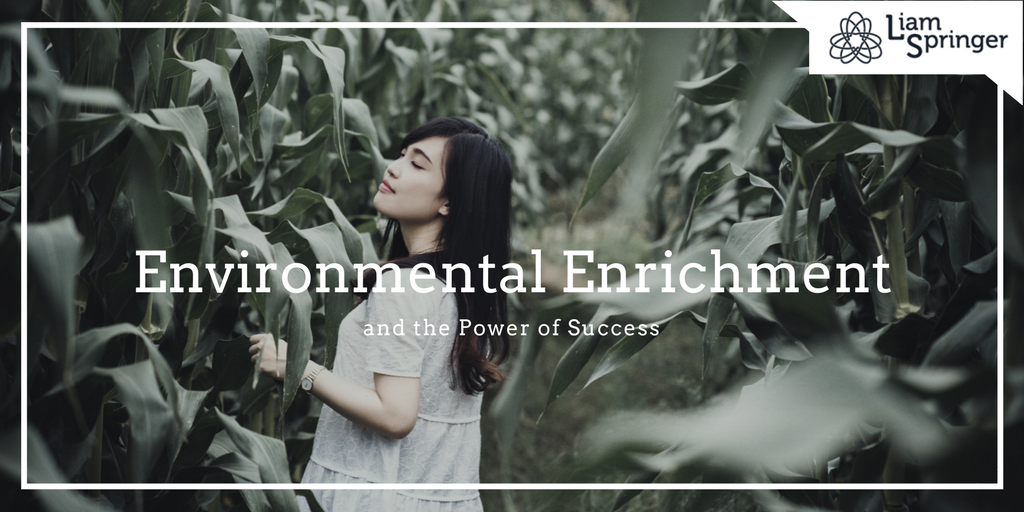
If you read my previous post, you already know that novel experience is shown to have a tremendous positive impact on health and healing. New sensations and experiences, such as those introduced through environmental enrichment, help to enhance brain plasticity, learning, and self-confidence. They also aid in the treatment and prevention of things like anxiety, depression, neurodegeneration, and food and drug addictions. But there’s one important caveat: In order to unleash the incredible healing power of novel experience, it must be accompanied by a feeling of success.
Remind Me: What Is Environmental Enrichment?
Environmental enrichment is the act of providing opportunities for successful interactions with novel experience. Sensory experiences (e.g., new sights, sounds, tastes, etc.), social interaction, and problem solving are all mechanisms that can be used to enrich an environment. The goal is to create an atmosphere that is engaging, stimulating, and challenging—but not too challenging. Participants’ overall experience should be enjoyable and successful, not scary or threatening or frustrating.
Experiences and interactions that are novel, rich, and engaging are shown to play a fundamental role in disease prevention and recovery. But, in order to be helpful and healing, they must be perceived as successful.
Why Is Success So Important?
Successful problem solving helps boost self-confidence and protects against future failures.1-2 Studies like this one support the idea that positive, successful interactions with the environment are far more beneficial than interactions that are perceived as negative.3 In fact, a previous negative experience can override the benefits of an interaction and also make you more sensitive to failure in the future. This is why the potential of novel experience is so intriguing.
For example, say you’ve had a bad experience with a corn maze in the past (e.g., you failed to solve the maze, got lost, and felt scared or trapped). If you visit another corn maze at a later time, the experience is likely to increase your stress and anxiety. On the other hand, say you’ve never done a corn maze before. If you have the opportunity to explore a maze that is fun and challenging (but not too difficult), you will likely have a positive and successful experience that engages your senses, exercises your mind, and builds your self-confidence. Plus, you will be more likely to succeed and benefit from any future encounters you have with similar types of mazes or puzzles.
Try, Try Again…
The goal of environmental enrichment is to provide opportunities for success with novel experiences. However, just because you failed at something in the past doesn’t mean you should avoid it all costs and only seek out brand new activities. An enriched environment may also act as a safe zone where you can face your fears and past failures—this time with the help of rational information and the support of others.
Reengaging the same environment with new information can help you overcome your fears and create a new positive experience—allowing for comfortable engagement in the future.
Again, let’s say you’ve had a negative past experience with a corn maze. But then you meet someone who’s successfully completed the maze many times and really enjoyed it. That person may be able to relieve your stress by giving you hope that trying again would predictably turn out better. With your confidence bolstered and your spirits lifted, you try again and succeed.
Remember: The stressfulness of a situation is largely determined by individual perception. Borrowing the perceptions of others through communication can relieve the anxiety and depression surrounding previous bad experiences or failures.4 Inspirational interactions like the example above can play an important role in healing and taking positive actions toward health.
Visit BTMAStudios.com to learn about BTMA Adventures, a series of community events that put environmental enrichment into action.
Want more insights on the latest topics in health and nutrition? Sign up for my monthly newsletter.
References
- Rosenbaum M, Ben-Ari K. Learned helplessness and learned resourcefulness: effects of noncontingent success and failure on individuals differing in self-control skills. J Pers Soc Psychol 48, No. 1 (Jan 1985): 198-215. https://www.ncbi.nlm.nih.gov/pubmed/3981388
- Alloy LB, Abramson LY. Learned helplessness, depression, and the illusion of control. J Pers Soc Psychol 42, No. 6 (Jun 1982): 1114-1126. https://www.ncbi.nlm.nih.gov/pubmed/7108740
- Fairhurst GD, Frey MD, Reichert JF, et al. Does environmental enrichment reduce stress? An integrated measure of corticosterone from feathers provides a novel perspective. PLoS One 6, No. 3 (Mar 2011): e17663. https://www.ncbi.nlm.nih.gov/pubmed/21412426
- Otte C. Cognitive behavioral therapy in anxiety disorders: current state of the evidence. Dialogues Clin Neurosci 13, No. 4 (Dec 2011): 413-421. https://www.ncbi.nlm.nih.gov/pmc/articles/PMC3263389/






